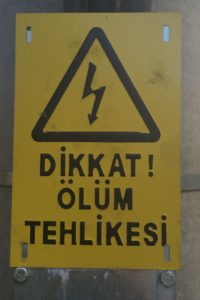Log in or register to save completed lessons.
Prerequisites for this Turkish Grammar Lesson
Vowel harmony-lar
I-type vowel harmony
E-type vowel harmony
Exceptions
Compound nouns
Grammar form:
- Noun1 Noun2 + (s) + i/ı/u/ü
In Turkish, compound nouns, also known as nominal compounds are formed when two or more nouns are used together to form a single phrase that acts like a noun. In these phrases, the last word in the phrase is modified or described by the other words in the phrase. While English does not mark these kinds of phrases with any special word ending, most compound nouns in Turkish are marked with the compound noun ending. To make this ending, add a single i type vowel (i, ı, u or ü) to the end of the last word in the phrase. If the last word ends in a vowel, however, you must add an “s” to the end of the word before adding the i-type vowel.
DİKKAT! ÖLÜM TEHLİKESİ
WARNING! DANGER OF DEATH (literally “death danger”)
Bebek sandalyesi
High chair (literally “baby chair”)
Atatürk Caddesi
Atatürk Street
Ankara İli
The Province of Ankara
Kol saati
Wristwatch
(Note that the word saat is an exception to normal vowel harmony)
Hayal dünyası
Dream world
Yurt dışı
Abroad (outside the country)
Mantar panosu
Bulletin board (literally “mushroom board”)
Cep telefonu
Cell phone
Pazar günü
Sunday (literally bazaar day)
Boğaziçi Köprüsü
The Bosphorus Bridge
Words ending with Ç, K, P, T
When the last word in a compound noun ends in ç, k, p or t, there is an extra step of changing the consonant before adding the compound noun ending. This step is also needed when adding other word endings that begin with a vowel in Turkish (for example, the ‑a/e ending that means to/toward). If the compound noun ends with ç, k, p or t, the last letter is replaced with another letter, as follows:
- ç gets replaced with c
- k gets replaced with ğ
- p gets replaced with b
- t gets replaced with d
Examples
| Araç (vehicle) | İtfaiye aracı (fire engine) |
| Kabuk (shell) | Deniz kabuğu (sea shell) |
| Yemek (meal) | Akşam yemeği (supper, literally, “evening meal”) |
| Böcek (bug) | Uğur böceği (ladybug, literally, “luck bug”) |
| Sahip (owner) | Ev sahibi (home owner) |
| Kebap (Kabob) | Tavuk şiş kebabı (Chicken Shish Kabob) |
| Kâğıt (paper) | Duvar kâğıdı (Wallpaper) (wall paper) |
Exceptions with Ç, K, P, T
But as with most language rules, there are exceptions. And for the compound noun ending, there are lots of exceptions. Firstly, for some words, the last word ends with ç, k, p or t, but the consonant does not get changed to c, ğ, b or d. This happens most often with words that end with the letter t.
Examples
Yurt içi
Domestic (lit. country interior)
Çankaya Köşkü
Çankaya Mansion
Futbol topu
Soccer ball
Türkiye Cumhuriyeti
The Republic of Turkey
Doğu Hindistan Şirketi
East India [Trading] Company
Compound nouns as one word
Sometimes, a compound noun gets used so often that it becomes its own word. When this happens, the compound noun still follows the same rules as a normal compound noun. But it becomes one word instead of two.
Examples
Gök (sky) + kuşak (sash) = gökkuşağı (rainbow)
Buz (ice) + dolap (cupboard) = buzdolabı (refrigerator)
Dil (language) + bilgi (knowledge) = dilbilgisi (linguistics)
Soy (anscestor) + ad (name) = soyadı (last name)
Ayak (foot) + kap (container) = Ayakkabı (shoe)
Çocuk ayakkabısı (kids shoe) ‑ Since ayakkabı here is treated as a single word, an additional compound noun ending can be added, unlike with normal compound nouns which only take one compound noun ending on the last word, regardless of the number of words in the compound noun.
Dropping vowels
In addition to the exceptions above, there is a small number of Turkish words that drop the last vowel in the word when adding the compound noun ending (or any other ending starting with a vowel). However, when you are figuring out the vowel harmony for the word ending, you still have to treat it as though the “dropped” vowel is still there. So, the compound noun ending matches the vowel that was dropped and not necessarily the other vowels in the word. Since most of these exception words follow vowel harmony, it does not matter for most of these cases. But it does matter for words like “vakit” and “akit” (see below).
Examples
| İzin (permission) | Oturma izni (residence permit) |
| Vakit (time) | Namaz vakti (Islamic prayer time) |
| Karın (stomach) | Koyun karnı (sheep stomach) |
| Oğul (son) | İnsanoğlu (person, literally “son of human”) |
| Vakıf (foundation) | Türkiye Diyanet Vakfı (The Religious Foundation of Turkey) |
| Akit (agreement) | Hizmet Akti (service agreement) |
| Şehir (city) | Yeraltı Şehri (underground city) |
| Keşif (discovery) | Petrol keşfi (petroleum discovery) |
Compound nouns with no ending
Also, some Turkish compound nouns do not have any ending on them at all. So they are handled more like how English handles compound nouns: by not marking them in any way. This is especially common for compound nouns where the first noun explains what the second noun is made of.
Examples
Pamuk şeker
Cotton candy
Taş köprü
Stone bridge
Altın kolye
Gold necklace
Tavuk şiş kebap
Chicken shish kabob
(Note that the names of various types of kabobs can also be given the compound noun ending: “tavuk şiş kebabı.”)
Parmak patates
French fries (literally “finger fries”)
Barbekü sos
Barbecue sauce
Erkek çocuk
Boy (literally “man child”)
Soyisim
Last name (literally “anscestor name”)
Compound nouns with repeated consonants
For a handful of words in Turkish, adding a compound noun ending requires repeating the last consonant in the word. When this is the case, the double consonant makes a longer sound than a single consonant would make. So there is a difference both in writing and in pronunciation.
Examples
Metro hattı
Metro line
Telif hakkı
Copyright
Çocukluk Sırrı
Childhood Secret (book title)
Ücret zammı
Wage increase
İncirlik Üssü
İncirlik (Military) Base
Compound nouns with repeated vowels
There are a few words in Turkish that end in an i-type vowel but that normally do not take an “s” before the compound noun ending. The most common of these words are “cami” and “bayi.” So if you add the compound noun ending to these words, it turns them into “camii” and “bayii.” However, while this double vowel at the end of the word is seen in writing, it is usually not noticeable in spoken language. Since this exception is very rare, many native Turkish speakers treat them like normal Turkish words and say “camisi” and “bayisi.” This is especially common in every day speech. But it is considered to be incorrect according to the standard grammar rules.
Examples
Sultan Ahmet Camii
Sultan Ahmet Mosque
Tekel bayii
liquor store (literally “single-hand dealer” or “monopoly dealer”)
Evlilik mevzuu
The topic of marriage
Sermaye temetüü
Capital dividend
Words ending in ‑nk
Also, there are a few words in Turkish that end in the letters, “nk” that are treated differently in compound nouns. When these words form a compound noun, the “k” at the end of the word turns into a hard “g” instead of a soft “ğ.” The most common of these exception words is “renk” (color). Since the others are rarely used in compound nouns, “renk” is the main one you need to remember.
Examples
Kahve (coffee) + renk (color) = kahverengi (Brown)
brown (literally “coffee color”)
Kafa (head) + denk (equivalent) = kafa dengi (Like-minded)
like-minded (literally “head equal”)
Yılbaşı (New Year’s or Christmas) + fiyonk (bow) = yılbaşı fiyongu (Christmas bow)
Christmas bow
Cenaze (funeral) + çelenk (wreath) = cenaze çelengi (Funeral wreath)
Funeral wreath
Compound nouns with the word “su”
Also, if a compound noun ends with the word “su,” the buffer consonant that is used is a “y” instead of the normal “s.”
Examples
Elma suyu
Apple juice (literally “apple water”)
Practice what you know
Now that you’ve gotten introduced to compound nouns in Turkish, you’re ready to practice what you know.
This lesson is a prerequisite for:
Past tense copula: how to say “was”idi
-(y)dı
vardı, yoktu
değildi
-(y)a
Using -(y)a with pronouns
nereye, buraya, şuraya, oraya
-(y)ı
When to use it
burayı, şurayı, orayı, nereyi
bunu, şunu, onu
-dan/den/tan/ten
bundan, şundan, ondan


Hey, the practice isn’t working, can you fix it please?
Thank you.
Thank you for reporting this issue. It should be working now.